SHARIA (ISLAMIC LAW)
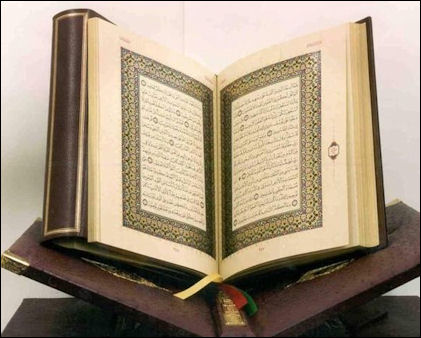 Qur'an Islamic Law, or Sharia (also Shari'a or Shariah ) is usually interpreted as "The Way" but literally means "well-worn camel path to the watering place." It does not refer to a body of law but is better viewed as a set of wide-ranging moral and broad ethical principles drawn from the Quran and the practices and sayings (hadith) of Prophet Muhammad. [Source: Asma Afsaruddin, Professor of Islamic Studies and former Chairperson, Department of Near Eastern Languages and Cultures, Indiana University, The Conversation, June 16, 2017]
Qur'an Islamic Law, or Sharia (also Shari'a or Shariah ) is usually interpreted as "The Way" but literally means "well-worn camel path to the watering place." It does not refer to a body of law but is better viewed as a set of wide-ranging moral and broad ethical principles drawn from the Quran and the practices and sayings (hadith) of Prophet Muhammad. [Source: Asma Afsaruddin, Professor of Islamic Studies and former Chairperson, Department of Near Eastern Languages and Cultures, Indiana University, The Conversation, June 16, 2017]
The broad principles of sharia are interpreted by classical Islamic schools of thought and jurists to come up with specific legal rulings and moral prescriptions. Governing public, private, social, religious and political life of Muslims, the laws are based on Qur’anic commands that are divine and absolute and can not be questioned. However, The body of legal rulings that emerges from the interpretations —Islamic law, or “fiqh” in Arabic — are the result of human intellectual activity and are therefore, by definition, fallible and changeable.
In its Islamic context, Sharia may be defined as the totality of God’s commands and exhortations, intended to regulate all aspects of human conduct and guide believers on the path of eternal salvation. Muslims generally believe that God at various times in human history chose to send his messengers, the prophets, to reveal the Sharia to the peoples of this world and that the Prophet Mohammed is the last messenger through whom God revealed the most perfect and complete version of Sharia. [Source: Issam M. Saliba, Senior Foreign Law Specialist, Library of Congress Law Library, Legal Legal Reports, 2010]
Almost all aspects of a Muslim's life are governed by Sharia. Muslim law tells followers how to perform their prayers, how to pay their alms, how to observe the fast. It also describes how Muslims should dress, what food Muslims can eat and even what greetings can be exchanged. Sharia is expected to be abided by as a system of laws and rules for living. It also sets forth an ethical ideal of which one is supposed to conform to.
Arthur Goldschmidt, Jr. Wrote in “A Concise History of the Middle East”: “Islam begins with a profession of faith, but it is manifested and elaborated by what Muslims do and what they condemn. Ever mindful of the impending Judgment Day, Muslims wish to know and to obey the rules of behavior that will please God and maintain a harmonious society. These rules have been carefully compiled and organized into a law code called the Shari'ah. It is somewhat like the Talmud for Orthodox Judaism; there is nothing comparable in Christianity. The Shari'ah tries to describe all possible human acts, classifying them as obligatory, recommended, neutral, objectionable, or forbidden in the eyes of God, the supreme legislator. The Shari'ah covers, in addition to commercial and criminal law, rules about marriage and divorce, child rearing, other interpersonal relationships, property, food and clothing, hygiene, and the manifold aspects of worship. At least up to the time of the Mongols, there was nothing a Muslim might experience or observe on which the Shari'ah was silent. [Source: Arthur Goldschmidt, Jr., “A Concise History of the Middle East,” Chapter. 8: Islamic Civilization, 1979, Internet Islamic History Sourcebook, sourcebooks.fordham.edu]
Sharia law is a mature legal system that, according to the late U.S. Supreme Court Justice Robert Jackson, has something to teach us. Religious scholar. H.A.R. Gibb wrote in the Encyclopedia of the World's Religions: “Regarding Sharia as simply a complicated legal system is inadequate. As governments failed to fulfill their original functions it became the task of religious leaders to make or re-make the communal life and order to all Muslims which has given the Muslim world that psychological unity which it continue to display at the present time. The accomplishment of this task gave powerful assistance to religious leaders."
See Separate Articles:
HISTORY AND DEVELOPMENT OF SHARIA (ISLAMIC LAW) africame.factsanddetails.com ;
FOUR SCHOOLS OF SUNNI SHARIA africame.factsanddetails.com ;
ISLAMIC JUSTICE SYSTEM: COURTS, QADIS (JUDGES) AND FATWAS africame.factsanddetails.com ;
EXTREME SHARIAH PUNISHMENTS factsanddetails.com ;
MUSLIM VIEWS AND INTERPRETATIONS OF SHARIA africame.factsanddetails.com
BLASPHEMY, APOSTASY AND SHARIA africame.factsanddetails.com
Websites on Sharia (Islamic Law): Oxford Dictionary of Islam /web.archive.org ; Encyclopædia Britannica britannica.com; Four Sunni Schools of Thought masud.co.uk ; Sharia by Knut S. Vikør, Oxford Encyclopedia of Islam and Politics web.archive.org ; Law by Norman Calder, Oxford Encyclopedia of the Islamic World web.archive.org ; Sharia Law in the International Legal Sphere – Yale University web.archive.org ; 'Recognizing Sharia' in Britain, anthropologist John R. Bowen discusses Britain's sharia courts bostonreview.net ; "The Reward of the Omnipotent" late 19th Arabic manuscript about Sharia wdl.org
RECOMMENDED BOOKS:
“Sharī'a: Theory, Practice, Transformations” by Wael B. Hallaq Amazon.com ;
“The Lawful and the Prohibited in Islam (Al-Halal Wal Haram Fil Islam) by Yusuf Al-Qaradawi Amazon.com ;
“Sharia Law for Non-Muslims” by Bill Warner PhD, et al. Amazon.com ;
“Introduction to Islamic Law: Principles of Civil, Criminal, and International Law under the Shari‘a” by Jonathan G. Burns Amazon.com ;
“Sharia Incorporated: A Comparative Overview of the Legal Systems of Twelve Muslim Countries in Past and Present” by Isabell Otto Amazon.com ;
“An Introduction to Islamic Law” by Wael B. B. Hallaq Amazon.com ;
“Islamic Jurisprudence According to the Four Sunni Schools: Al-Fiqh 'Ala al-Madhahib al-Arba 'ah–Volume I Acts of Worship” by 'Abd al-Rahman al-Jazir Amazon.com ;
“The Four Juristic Schools: Their Founders, Development, Methodology & Legacy”
by Islamic Research Team Do Fatwa Kuwait Amazon.com ;
“Blasphemy and Apostasy in Islam: Debates in Shi’a Jurisprudence” by Mohsen Kadivar, Hamid Mavani, et al. Amazon.com ;
“Islam Explained: A Short Introduction to History, Teachings, and Culture” by Ahmad Rashid Salim Amazon.com ;
“No God but God” by Reza Aslan Amazon.com ;
“Welcome to Islam: A Step-by-Step Guide for New Muslims” by Mustafa Umar Amazon.com
Sharia Law Defined
The law, as we understand the word in the West, meaning the rules that regulate relations among people, is an integral part of Sharia. Rules of law are rules of Sharia, but not all the rules of Sharia are rules of law. However, the words “Sharia” and “law” are often used interchangeably. [Source: Issam M. Saliba, Senior Foreign Law Specialist, Library of Congress Law Library, Legal Legal Reports, 2010 |*|]
After the death of the Prophet Mohammed, Muslim jurists known as fuqaha’ (singular faqih) began studying the Sharia to discern its legal rules, leading to the formation of schools of Islamic legal thought known as mazahib (singular mazhab). The work of these schools initiated a new discipline of Islamic study known as ilm al-fiqh or the science of knowledge. The Islamic legal theory espoused by these schools compared the law to a tree with few roots and many branches and divided ilm al-fiqh into ilm al-usul, or science of the roots, and ilm al-fourou’, or science of the branches. |*|
 2.jpg)
First Surah of the Qur’an (fragment) Ilm al-usul dealt with the philosophical underpinning of Sharia law and the methodology used to elucidate the legal rules applicable in the various fields of the law, while ilm al-fourou’ dealt with the actual elucidation of these rules. The elucidation process is called ijtihad, or exertion of the utmost efforts in seeking to translate God’s commands and exhortations into specific legal rules. |*|
Ilm al-fourou’ is divided into two major components, ibadat and muamalat. Ibadat means “worship” and consists of the rules applicable to religious rituals such as prayer, fasting, and pilgrimage. These rules are mandatory, but their implementation is left to the personal decisions of the believers. Muamalat, on the other hand, means “transactional dealings” and consists of the rules applicable to commercial and other types of relations, such as trade, marriage, and partnerships. The rules of muamalat constitute a comprehensive legal system whose legal rules can be identified by consulting the writings of the jurists of the relevant school of Islamic legal thought. |*|
Sharia law may vary from one school to another on certain issues. For example, according to the Shia Jaafari school, the law of inheritance gives the daughters of the deceased parents the right to inherit all non-reserved parts of the estate in the absence of male siblings, while the Sunni schools (Hanafi,Shafi’i, Maliki, and Hanbali) do not. |*|
Sharia is clearest on personal matters such as marriage, divorce and inheritance. It is not clear on commercial, penal and constitutional matters and does not address legal matters at all. In most Muslim countries the state has set up its own court system that operates independent of the Sharia courts. These non-Sharia courts have traditionally handled criminal cases and cases that deal with land and finance. If there a conflict between the two courts Sharia courts are generally considered more authoritative. The other courts have iften traditionally been based on local laws. Sharia often has not been applied to non-Muslims.
Principals of Islamic Law
Faraz Rabbani wrote for the BBC: “The Sharia regulates all human actions and puts them into five categories: 1) obligatory, 2) recommended, 3) permitted, 4) disliked or 5) forbidden. Obligatory actions must be performed and when performed with good intentions are rewarded. The opposite is forbidden action. Recommended action is that which should be done and the opposite is disliked action. Permitted action is that which is neither encouraged nor discouraged. Most human actions fall in this last category. The ultimate worth of actions is based on intention and sincerity, as mentioned by the Prophet, who said, "Actions are by intentions, and one shall only get that which one intended." Classical Sharia manuals are often divided into four parts: laws relating to personal acts of worship, laws relating to commercial dealings, laws relating to marriage and divorce, and penal laws. [Source: Faraz Rabbani, BBC, September 3, 2009] An underlying assumption of Sharia is that only God can distinguish between good and evil and man's reasoning is subject to errors and thus should be eliminated whenever possible. But even under these guide lines a number of different, often contradictory interpretations, developed.
“Shariah” can be broken down into haram (“forbidden”) and halal (“permissible”). One thing a Muslim must discover is what is covered by Islamic law and what is not with the general understanding being that if an activity is not addressed by a law then is okay to apply personal reasoning to determine whether it is okay or not.
One key to evaluating and understanding Sharia is not just analyzing the laws themselves but also examining the penalties for breaking the laws. If someone breaks a Muslim law that doesn't harm anyone too badly such as drinking alcohol or eating pork and promises to rectify it is a personal matter and the process is not all that different from a Christian committing a sin and confessing it or promising not do it again. But if a Muslim is charged with blasphemy or apostasy for questioning something in Islam, attempting to understand its history or converting to a different religion and is sentenced to death then it becomes a different matter. Sharia practiced in most extreme form is notorious of its cruel punishments: chopping of limbs, beheading and stoning to death. These practices violate most international norms of human rights.
Because Sharia is so rigid and can be interpreted in such extreme ways for a long time it was ignored. One religious scholar wrote: “Both the Muslim theory of law and the pursuit of unity implied a fixation and degree of formal rigidity which gave little room for flexibility...the eternal rigidity to the justice formulation often gave the Sharia the character of an ideal system or counsel of perfection...It became increasingly and theatrical construction, divorced from actual practice." The Sudanese American law professor Abdullah An-Na’m has said that Sharia is essentially an attempt to “protect a patriarchal system."
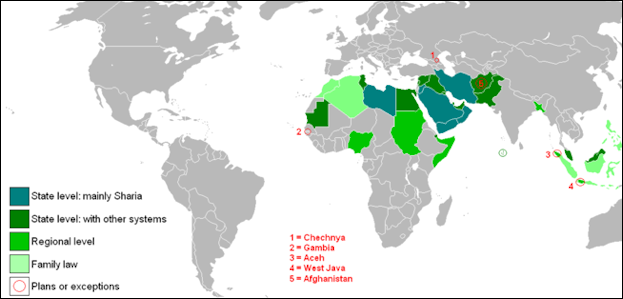
Countries where Sharia is employed
Sharia Versus Western Law
Civil law in most Muslim majority countries is based upon modern Western legal systems, a legacy of the period of European colonization of much of the Islamic world starting in the 19th century. Thus, Egypt borrowed the French civil code, while Turkey adopted Swiss civil law and Indonesia Dutch. The notable exceptions are Saudi Arabia and Iran, which apply Islamic law in the civil and public sphere as well. In the Muslim-majority countries of Pakistan and Afghanistan, tribal law known as jirga law sometimes takes precedence over Islamic law. [Source: Asma Afsaruddin, Professor of Islamic Studies and former Chairperson, Department of Near Eastern Languages and Cultures, Indiana University, The Conversation, June 16, 2017]
Sharia is not a code of laws in the Western sense in terms out of outlining laws and fixing a penalties for breaking those laws. Rather they are classifications of acts: standards of conducts and moral evaluations of this actions (such obligatory, recommended or forbidden) without necessarily attaching penalties to breaking them. Sharia also differs significantly from Western traditions in that religious obligations that would not be a legal matter in the West are regarded as such in Sharia.
Asifa Quraishi-Landes wrote in the Washington Post: “Sharia isn’t even “law” in the sense that we in the West understand it. And most devout Muslims who embrace sharia conceptually don’t think of it as a substitute for civil law. Sharia is not a book of statutes or judicial precedent imposed by a government, and it’s not a set of regulations adjudicated in court. Rather, it is a body of Qur’an-based guidance that points Muslims toward living an Islamic life. It doesn’t come from the state, and it doesn’t even come in one book or a single collection of rules. Sharia is divine and philosophical. The human interpretation of sharia is called “fiqh,” or Islamic rules of right action, created by individual scholars based on the Qur’an and hadith (stories of the prophet Muhammad’s life). Fiqh literally means “understanding” — and its many different schools of thought illustrate that scholars knew they didn’t speak for God. [Source: Asifa Quraishi-Landes, Washington Post, June 24, 2016, Asifa Quraishi-Landes is an associate professor at the University of Wisconsin School of Law. ~~]
“Fiqh distinguishes between the spiritual value of an action (how God sees it) and the worldly value of that action (how it affects others). Fiqh rules might obligate a devout Muslim to pray, but it’s not the job of a Muslim ruler to enforce that obligation. Fiqh is not designed to help governments police morality in the way, say, Saudi Arabia does today. According to classical fiqh scholarship, a Muslim ruler’s task was to put forth another type of law, called siyasa, based on what best serves the public good. The most vivid example of this was the recognition of incestuous (mother-son, brother-sister) marriages practiced by some non-Muslim minorities living under Muslim rule, dating back at least to the 14th century, despite the abhorrence, generally, of such marriages to Islam. In other words, sharia doesn’t hold that everything objectionable to Islam should be outlawed.” ~~

Map of legal system in the Muslim world and neighboring regions
Philosophy Behind of Sharia: Clear Path to Water
Faraz Rabbani wrote for the BBC: “For Muslims, life did not begin at birth, but a long time before that. Before even the creation of the first man. It began when God created the souls of everyone who would ever exist and asked them, "Am I not your Lord?" They all replied, "Yea." God decreed for each soul a time on earth so that He might try them. Then, after the completion of their appointed terms, He would judge them and send them to their eternal destinations: either one of endless bliss, or one of everlasting grief. This life, then, is a journey that presents to its wayfarers many paths. Only one of these paths is clear and straight. This path is the Sharia.” [Source: Faraz Rabbani, BBC, September 3, 2009 |::|]
The Qur’an reads: “For each We have appointed a divine law and a traced-out way. Had God willed, He could have made you one community. But that He may try you by that which He has given you. So vie one with another in good works. Unto God you will all return, and He will then inform you of that wherein you differ. — Qur'an, 5:48
Rabbani wrote: In Arabic, Sharia means "the clear, well-trodden path to water". Islamically, it is used to refer to the matters of religion that God has legislated for His servants. The linguistic meaning of Sharia reverberates in its technical usage: just as water is vital to human life, so the clarity and uprightness of Sharia is the means of life for souls and minds. Throughout history, God has sent messengers to people all over the world, to guide them to the straight path that would lead them to happiness in this world and the one to follow. All messengers taught the same message about belief (the Qur'an teaches that all messengers called people to the worship of the One God), but the specific prescriptions of the divine laws regulating people's lives varied according to the needs of his people and time. |::|
“The Prophet Muhammad (God bless him and give him peace) was the final messenger and his Sharia represents the ultimate manifestation of the divine mercy. "Today I have perfected your way of life (din) for you, and completed My favour upon you, and have chosen Islam as your way of life." (Qur'an, 5:3) The Prophet himself was told that, "We have only sent you are a mercy for all creation." (Qur'an, 21:179)” |::|
Sources of Islamic Law
The sources of the Sharia are 1) the Qur'an (the Muslim holy book); 2) The Hadith (sayings) and Sunnah (example) of Muhammad ; 3) interpretation by analogy (qiya); 4) consensus of the ummah, or scholarly consensus (ijma'); and 5) the rulings and judicial opinions of Islamic scholars (fatwas)
1) the Qur’an contains moral directives. 2) The Hadith and Sunnah of Muhammad illustrate Islamic faith in practice and explaining Qur’anic principles. 3) Qiyas, reasoning by analogy, are used by scholars facing a new situation or problem when no clear text can be found in the Qur’an or hadith or sunnah. 4) ijma (consensus) originated with a reported saying of Muhammad, "My community will never agree on an error." It came to mean the consensus among religious scholars could determine the permissibility of an action. [Source: John L. Esposito “Worldmark Encyclopedia of Religious Practices”, 2000s, Encyclopedia.com]

Use of sharia by country: 1) Countries and members of the Organisation of Islamic Cooperation where sharia plays no role in the judicial system (bluish green); 2) Countries where sharia applies in personal status issues (such as marriage, divorce, inheritance, and child custody) (yellow); 3) Countries where sharia applies in full, covering personal status issues as well as criminal proceedings (purple); 4) Countries with regional variations in the application of sharia (orange)
The original sources of Sharia are the Qur’an and the Hadith. The Qur’an is the collection of the utterances believed by Muslims to be the literal words of God transmitted to the prophet Mohammed through the Angel Gabriel. These utterances, consisting of more than 6, 000 verses, were collected shortly after the death of the Prophet Mohammed in 632 A.D. and organized into 114 chapters in a single book, the Qur’an, which is accepted by all Muslims as the authentic Holy Book of the religion. The Hadith is the authenticated record of sayings and deeds of the Prophet (Muhammad) and his earliest companions that use the example of the Prophet as the basis for law. They are believed by Muslims to have been inspired by God and to therefore have the same original value in expressing the divine Will of God as the Qur’an. [Source: Issam M. Saliba, Senior Foreign Law Specialist, Library of Congress Law Library, Legal Legal Reports, 2010]
Ruqaiyyah Waris Maqsood, a British Muslim, told the BBC: “The Prophet Muhammad (pbuh) laid down the laws - some of them were direct commands stated in the revelation of the Qur'an; other laws grew up based on the Prophet's own example and the various rulings he gave to cases that occurred during his lifetime. These secondary laws are based on what's called the Sunnah - the Prophet's words, example, and way of life. “So, all the laws of Sharia are based primarily on Qur'an and then on Sunnah, and after that, if there was no information in those two sources, judges were free to use their intelligence to make analogies. As in most legal systems, cases could then be referred to by later judges. [Source: Ruqaiyyah Waris Maqsood, BBC, September 3, 2009 |::|]
How the Sources of Islamic Law Are Viewed
The primary sources of Sharia are the Qur'an and the Hadith. The other sources are viewed as interpretations of the Qur’an and Muhammad’s statements and actions, with scholarly consensus (ijma') and legal analogy (qiyas) being the two agreed-upon derived sources of Sharia:. Devout Muslims regard their words, acts, and decisions — called collectively the sunna — as models to be emulated by later generations. Because of its normative character, the sunna is revered along with the Qur’an as a primary source of sharia. [Source: BBC, Library of Congress]
Arthur Goldschmidt, Jr. wrote; “Historians of Islam see in the Shari'ah elements taken from many ancient legal systems. But Muslims believe that the principals for all Muslim laws lie within the Qur’an and any supplementation that is done is matter of clarifying or elaborating on the texts to new application as they pop up. An example of this is the law on giving alms. The Qur’an states that one must give alms but did not state how much. The amount was determined by Muhammad's statements and actions as transmitted by his Companions. [Source: Arthur Goldschmidt, Jr., “A Concise History of the Middle East,” Chapter. 8: Islamic Civilization, 1979, Internet Islamic History Sourcebook, sourcebooks.fordham.edu]
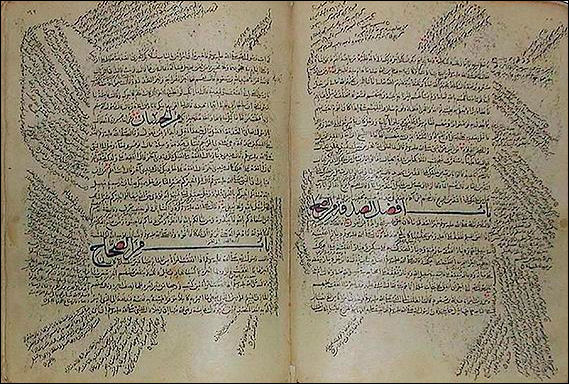
Hadith Al-Nabawi
John L. Esposito wrote in the “Worldmark Encyclopedia of Religious Practices”: Concern for justice led to the development of subsidiary legal principles: equity (istihsan), which permits exceptions to strict, or literal, legal reasoning, and public interest (maslaha) or human welfare, which give judges flexibility in arriving at just and equitable decisions. Shias also include collections of the traditions of Ali, who they believe was the first caliph to succeed Muhammad, and of other imams, the ruling descendants of Muhammad through Ali, whom they regard as supreme authorities and legal interpreters. [Source: John L. Esposito “Worldmark Encyclopedia of Religious Practices”, 2000s, Encyclopedia.com]
Conservative Muslims and Muslim extremists have manipulated Muslim law by merging doctrines that are under debate, such as the veiling of women, with those such etched in stone, such as the five pillars of Islam, and claiming that none of them can be changed or criticized and to do so is blasphemy or apostasy because it calls into doubt the word of God.
Quran as a Source of Islamic Law
The Qur’an provide the basis for Islamic law. It is full of rules that govern almost all aspects of public and private behavior that Muslims are expected to follow acts of as submission to God. But at the same time many of the rules and the basis for them in the Qur’an are very vague and Sharia is based more on how these vague rules and statements are interpreted. By one estimate Sharia is based on only 500 verses from the Qur’an, or about 16 percent of the holy book.
Arthur Goldschmidt, Jr. wrote: The Quran contains many commandments and prohibitions, as well as value judgments on the actions of various individuals and groups in history. Let me give some examples. The Quran lays down explicit rules, obeyed by all Muslims up to modern times, for divorce (2:226-238), contracting debts (2:281-283), and inheriting property (4: 11-17). When it describes the wickedness of the dewellers on Sodom (7:78- 82), the message is implicit: clearly their acts are unlawful for Muslims. But the variety of human action far exceeds what the Quran could cover. It might order people to pray, but only the exmaple of Muhammad taught Muslims how to do so. [Source: Arthur Goldschmidt, Jr., “A Concise History of the Middle East,” Chapter. 8: Islamic Civilization, 1979, Internet Islamic History Sourcebook, sourcebooks.fordham.edu]
Faraz Rabbani wrote for the BBC: “The Qur'an was revealed to the Prophet gradually, over 23 years. The essence of its message is to establish the oneness of God and the spiritual and moral need of man for God. This need is fulfilled through worship and submission, and has ultimate consequences in the Hereafter. The Qur'an is the word of God. Because of its inimitable style and eloquence, and, above all, the guidance and legal provisions it came with, it ensures the worldly and next-worldly welfare of humanity. [Source: Faraz Rabbani, BBC, September 3, 2009 |::|] “God Most High said, "Verily, this Qur'an guides to that which is best, and gives glad tidings to the believers who do good that theirs will be a great reward." (Qur'an, 17:9) And, "There has come unto you light from God and a clear Book, whereby God guides those who seek His good pleasure unto paths of peace. He brings them out of darkness unto light by His decree, and guides them unto a straight path." (Qur'an, 5:15) |::|
Hadiths
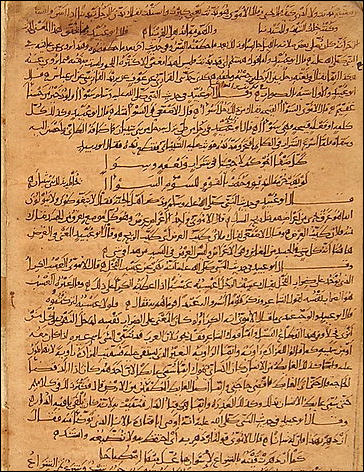
Gharib al-Hadith-page 19 The Hadith are an authenticated record of sayings and deeds of the Prophet Muhammad and his earliest companions. The words, acts, and decisions of Muhammad and his companions— collectively called the sunna — are viewed as precedents for Islamic social and legal customs and as models to be emulated by later generations. The Hadith also includes the sira, biographies of the Muhammad, and tafsir and tawil, Qur’anic commentary and explanation.
There are literally tens of thousands of hadiths, some of which contradict others. In the early centuries after Muhammad's death religious schools went through them, evaluated them, evaluated their sources and decided which ones fit the moral vision of God and deserved emphasis.
The Hadith provides the basis for much of Islamic law. It contains many laws and rules based on interpretations of the Qur’an. Much of Islamic thought is found in the Hadith partly because the Hadith has traditionally been understood to be a text open to "interpretation. argument and rigorous intellectual inquiry."
The Hadith is a collection of more than 60,000 accounts of Muhammad's words and actions. They are divided into six revered collections, or sahib , meaning “sound." The authenticity of some hadiths is still a matter of debate. Those who told the stories, and recorded them, were not always reliable.
There are 170,000 known narrations of the prophet's sayings. They are supposed to record Muhammad's words and deeds as a guide to daily life and a key to some of the mysteries the Qur’an. Many of the these anecdotes came out of specific historical contexts that occurred much later. Mehmet Gormez, a theology professor at the University of Ankara, told Newsweek, sometimes the scholars who produced the Hadiths confused “universal values of Islam with geographical, cultural and religious values of their time and place. Every Hadith narration has...a context."
Some hadiths with historical contexts are erroneously used to justify modern prohibtions. One that forbids women from traveling alone is used to deny women the right to drive in Saudi Arabia. Gormez said, “This is clearly not a religious injunction but related to security in a specific time and place. In the Qur’an Muhammad laments the days when women could travel alone from Yemen to Mecca."
See Separate Article: HADITHS (MUHAMMAD'S SAYINGS): HISTORY, USES, HOW THEY WERE COMPILED africame.factsanddetails.com
Scholarly Consensus (Ijma') and Legal Analogy (Qiyas)
There are two agreed-upon derived sources of Sharia: scholarly consensus (ijma') and legal analogy (qiyas). Analogies and generalization, in some cases, are given credence. For example the Qur’an explicitly prohibits wine made from grape juice but does not mention other fermented drinks. But by saying wine is an analogy for all alcoholic drinks the prohibition on wine can be extended to all alcoholic drinks. Muslims also believe in the principal of "the lesser of two evils." It is okay, for example, for a Muslim to eat pork to stave off starvation and it is alright for a women to get an abortion if her life is in danger.
Faraz Rabbani wrote for the BBC: “The basis for scholarly consensus being a source of law is the Qur'anic command to resolve matters by consultation, as God stated, "Those who answer the call of their Lord, established prayer, and whose affairs are by consultation." (42:38) Scholarly consensus is defined as being the agreement of all Muslim scholars at the level of juristic reasoning (ijtihad) in one age on a given legal ruling. Given the condition that all such scholars have to agree to the ruling, its scope is limited to matters that are clear according to the Qur'an and Prophetic example, upon which such consensus must necessarily be based. When established, though, scholarly consensus is decisive proof. [Source: Faraz Rabbani, BBC, September 3, 2009 |::|]
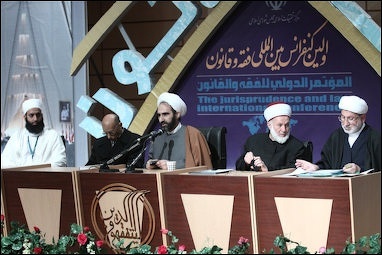
Conference of Muslim clerics
“Legal analogy is a powerful tool to derive rulings for new matters. For example, drugs have been deemed impermissible, through legal analogy from the prohibition of alcohol that is established in the Qur'an. Such a ruling is based on the common underlying effective cause of intoxication. Legal analogy and its various tools enables the jurists to understand the underlying reasons and causes for the rulings of the Qur'an and Prophetic example (sunna). This helps when dealing with ever-changing human situations and allows for new rulings to be applied most suitably and consistently. |::|
Arthur Goldschmidt, Jr. wrote: “Various scholars helped to formulate the Shari'ah itself, which they did by writing books that compiled the laws of Islam for reference and guidance. Because of the numerous changes that had occurred in the ummah since the lifetime of the Prophet, the Quran and the hadith compilations could not, in the view of most ulama, cover every conceivable problem. They also adopted reasoning by analogy, comparing a new situation with one for which legislation already existed. The Quran forbids Muslims to drink wine; therefore, the ulama reasoned that all liquors having the same effect as wine should also be banned. [Source: Arthur Goldschmidt, Jr., “A Concise History of the Middle East,” Chapter. 8: Islamic Civilization, 1979, Internet Islamic History Sourcebook, sourcebooks.fordham.edu /~]
“In much of what they wrote, Muslim scholars looked to the consensus of the ummah to settle hard legal points. This did not mean polling every Muslim from Cordoba to Samarqand. Rather, consensus meant that which could be agreed upon by those who had studied the law. It was through this practice that many laws from older societies were incorporated into the Shari'ah. Thus the laws of Islam could cover lives far removed from conditions known to Muhammad: a sailor in the Indian Ocean, a rice farmer in the marshes of lower Iraq, or a Turkish horse nomad in Transoxiana. In addition, the early legists incorporated decisions that had been made by the wisest judges in difficult or contested cases, rather as legal precedents are used in the administration of Anglo-Saxon law. The inclusion of "judicial opinion" gave the Shari'ah added flexibility and relevance to changing needs and changing conditions. In time, however, this fifth source fell out of common use.” /~\
Sunni Legal System: the Four Schools
Numerous schools of legal thinking (fiqh, madhhab) came into being in the formative period of Islam. The four main Sunni schools of sharia (Islamic law) that remain today developed in the first 200 years of Islam in the A.D. 7th and 8th centuries. . They included the Hanafi, Maliki, Shafi'i and Hanbali — all of which are still active.
The four main schools of Sunni sharia are: : 1) Hanifa, the largest and most liberal school (common in India, Pakistan, Bangladesh, Turkey, Afghanistan and Central Asia); 2) Shafi'i, a conservative school that emphasizes on the opinions of the companions of the Prophet Muhammad (common in Egypt, Indonesia, East Africa and Syria); 3) Maliki, or reformed school based on the practices of the people of Medina during Muhammad's lifetime. (North and West Africa)," and 4) Hanbali (Arabia and Northern Nigeria, linked with the puritanical Wahhabi sect), the smallest and strictest sect.
The schools are pretty similar and difference are connected with principals of legal reasoning, justifications based on the hadiths and the limits of the law. Each school has its own law books and courts. Local customs in the places where the schools developed have also influenced the legal code of each school.
See Separate Article: FOUR SCHOOLS OF SUNNI SHARIA africame.factsanddetails.com
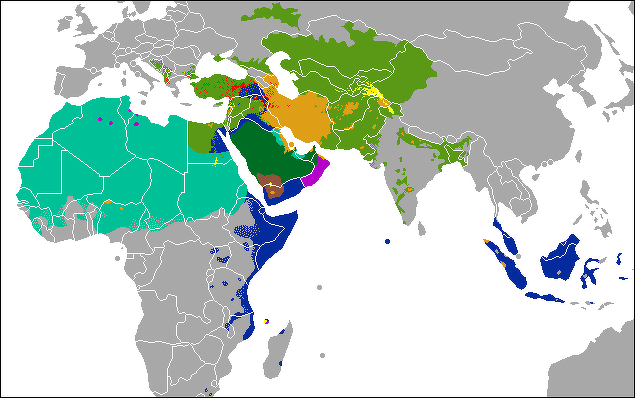
Sharia fiqhs (schools): Sunni: 1) Hanafi (light olive green); 2) Hanbali (dark green); 3) Malaki (light blue); Shafi’i (dark blue); Shia: 1) Ismaili (yellow); 2) Jafari (light brown); 3) Zaidi (dark brown); 4) Other (red). Other: 1) Ibadi (purple)
Shia Sharia
Shia have their own legal schools of Sharia that defines their way of doing prayer actions, going about personal relations, treating criminals and dealing with other matters. Legal precedents are reached on the basis of decisions made with imam rather than made by the Muslim community, which is the case with the four main schools. Shia law refuses to accept traditions not transmitted through Ali or one of his descendants. Shia rejecte the doctrine of the ijma, saying that laws can only be interpreted by the Imams of the House of Ali. The primary schools of law for Shia are the Jafari and Zaydi schools.
Arthur Goldschmidt, Jr. wrote in “A Concise History of the Middle East”: “Shi'i jurisprudence also relies on the Quran, hadiths (with the difference that an authenticating isnad should include one of the legitimate imams), analogy, and consensus. Some differences do exist between Shi'i and Sunni Muslims over the authenticity of certain statements by the Prophet, especially on whether he was partial to Ali. [Source: Arthur Goldschmidt, Jr., “A Concise History of the Middle East,” Chapter. 8: Islamic Civilization, 1979, Internet Islamic History Sourcebook, sourcebooks.fordham.edu /~]
“In certain matters Shi'i law is more permissive: it allows temporary marriage, the female line receives a slightly larger share of the inheritance, and some sects let a Shi'i Muslim deny his religious identity if his safety is at stake. The major difference is that, while most Sunni rites allow no reinterpretation of the Shari'ah, in Shi'ism the imams can interpret the law and are regarded as being, in principle, alive. /~\
“Among Twelve-Imam Shi'is, whose last imam is hidden, certain qualified legal experts called mujtahids can interpret the Shari'ah until the twelfth imam reappears. This "interpretation" (Vtihad) does not mean changing the law to suit one's temporary convenience, but rather the right to go back to and examine the Quran and the hadith compilations without being bound by consensus. /~\
“In this sense, Shi'ism has kept a flexibility long since lost by the Sunni majority, and the Shi'i ulama, especially the mujtahids, have remained influential in countries like Iran right up to modern times. Indeed, the central issue among Sunni Muslim ulama committed to Islamic reform has been to regain for themselves the right of ijtihad.” /~\
Islamic Legal Philosophy of Needs and Comforts

Hanafi scholar and leader, Hazrat Allama Mufti Syed Faheem Ahmed Shah
Faraz Rabbani wrote for the BBC: “God sent prophets and books to humanity to show them the way to happiness in this life, and success in the hereafter. This is encapsulated in the believer's prayer, stated in the Qur'an, "Our Lord, give us good in this life and good in the next, and save us from the punishment of the Fire." (2:201) [Source: Faraz Rabbani, BBC, September 3, 2009 |::|]
“The legal philosophers of Islam, such as Ghazali, Shatibi, and Shah Wali Allah explain that the aim of Sharia is to promote human welfare. This is evident in the Qur'an, and teachings of the Prophet. The scholars explain that the welfare of humans is based on the fulfillment of necessities, needs, and comforts. Necessities are matters that worldly and religious life depend upon. Their omission leads to unbearable hardship in this life, or punishment in the next. There are five necessities: preservation of religion, life, intellect, lineage, and wealth. These ensure individual and social welfare in this life and the hereafter. |::|
“The Sharia protects these necessities in two ways: firstly by ensuring their establishment and then by preserving them. 1) To ensure the establishment of religion, God Most High has made belief and worship obligatory. To ensure its preservation, the rulings relating to the obligation of learning and conveying the religion were legislated. 2) To ensure the preservation of human life, God Most high legislated for marriage, healthy eating and living, and forbid the taking of life and laid down punishments for doing so. 3) God has permitted that sound intellect and knowledge be promoted, and forbidden that which corrupts or weakens it, such as alcohol and drugs. He has also imposed preventative punishments in order that people stay away from them, because a sound intellect is the basis of the moral responsibility that humans were given. 4) Marriage was legislated for the preservation of lineage, and sex outside marriage was forbidden. Punitive laws were put in placed in order to ensure the preservation of lineage and the continuation of human life. 5) God has made it obligatory to support oneself and those one is responsible for, and placed laws to regulate the commerce and transactions between people, in order to ensure fair dealing, economic justice, and to prevent oppression and dispute. |::|
“Needs and comforts are things people seek in order to ensure a good life, and avoid hardship, even though they are not essential. The spirit of the Sharia with regards to needs and comforts is summed up in the Qur'an, "He has not placed any hardship for you in religion," (22:87) And, "God does not seek to place a burden on you, but that He purify you and perfect His grace upon you, that you may give thanks." (5:6) Therefore, everything that ensures human happiness, within the spirit of Divine Guidance, is permitted in the Sharia.” |::|
Theological Basis of Sharia
Faraz Rabbani wrote for the BBC: “The ultimate aim of those who submit to the Sharia is to express their slavehood to their Creator. But the Sharia does bring benefit in this world too. This way has been indicated in a Divine statement conveyed by the Prophet. “My servant approaches Me with nothing more beloved to Me than what I have made obligatory upon him, and My servant keeps drawing nearer to Me with voluntary works until I love him. And when I love him, I am his hearing with which he hears, his sight with which he sees, his hand with which he seizes, and his foot with which he walks. If he asks Me, I will surely give to him, and if he seeks refuge in Me, I will surely protect him.” — - Prophet Muhammad, reported by Bukhari [Source: Faraz Rabbani, BBC, September 3, 2009 |::|]

Qur'an and Hadith conference
“If the legal dimension of the Sharia gives Islam its form, the spiritual dimension is its substance. The spiritual life of Islam, and its goal, was outlined in the Divine statement (mentioned above). The Prophet explained spiritual excellence as being, "To worship God as though you see Him, and if you see Him not, [know that] He nevertheless sees you. |::|
“The spiritual life of Islam is a means to a realization of faith and a perfection of practice. It is to seek the water that the Sharia is the clear path to, water that gives life to minds and souls longing for meaning. It is this spiritual life, at its various levels, that attracts Muslims to their religion, its way of life, and to the rulings of the Sharia. “And those who believe are overflowing in their love of God.” — Qur'an 2:165 |::|
Ruqaiyyah Waris Maqsood, a British Muslim, told the BBC: “These are to see the will of God done on earth as it is in Heaven (as in the Christian Lord's Prayer). How can we possibly know this will? By study of the revealed scriptures and by choosing talented, intelligent and far-sighted merciful people of excellent character as our judges. The whole principle of God's will is to bring about compassion, kindness, generosity, justice, fair play, tolerance, and care in general, as opposed to tyranny, cruelty, selfishness, exploitation etc.” [Source: Ruqaiyyah Waris Maqsood, BBC, September 3, 2009 |::|]
Sharia and Muslim Daily Life and Society
According to the “Encyclopaedia Judaica”: From the very beginning, Islam strove to control the life of the community in all fields. Like Judaism, Islam is not satisfied with regulating man's obligation toward God, but also aspires to regulate his daily behavior and legislates in matters which in other cultures belong to the field of civil or secular law. Legal matters do not constitute a major part of the Qur’an, though topics such as the law of marriage, divorce, inheritance, and penalties for a restricted number of transgressions (theft, highway robbery, wine drinking, unlawful sexual intercourse and false accusation thereof) are discussed in some detail.[Source: Haïm Z’ew Hirschberg, “Encyclopaedia Judaica”, 2000, Encyclopedia.com]
According to the “Worldmark Encyclopedia of Religious Practices”: Islamic law, which includes requirements for worship as well as for social transactions, has been seen as providing the ideal blueprint for the believer who asks, "What should I do?" The law covers regulations for religious rituals and for such social transactions as marriage, divorce, and inheritance and sets standards for penal and international law. Traditionally religious scholars (ulama) and judges, courts, or governments have been responsible for elaborating and applying the law. [Source: John L. Esposito “Worldmark Encyclopedia of Religious Practices”, 2000s, Encyclopedia.com]
Asma Afsaruddin wrote: Sharia provides guidance on how to live an ethical life. It lays down guidelines on how to pray and how to treat one’s family members, neighbors and those who are in need. It requires Muslims to be just and fair in their dealings with everyone, to refrain from lying and gossip, etc., and always to promote what is good and prevent what is wrong.
Muslim scholars reflecting on the larger objectives of Sharia have said that laws derived from it must always protect the following: life, intellect, family, property and the honor of human beings. These five objectives create what we may consider to be a premodern Islamic Bill of Rights, providing protection for civil liberties. [Source: Asma Afsaruddin, Professor of Islamic Studies and former Chairperson, Department of Near Eastern Languages and Cultures, Indiana University, The Conversation, June 16, 2017]
On how sharia addresses individual rights versus the needs of society, Ruqaiyyah Waris Maqsood told the BBC: “Basically in Islam the needs of society always come first, with the proviso that injustices should always be able to be taken to judges who are not corrupt. The old Arab system allowed any person, no matter how humble, to take his/her case to the highest in the land personally. Islam brings a very strong sense of justice, and care of the oppressed and exploited. [Source: Ruqaiyyah Waris Maqsood, BBC, September 3, 2009 |::|]
Does Sharia make life easier or harder for the ordinary Muslim? “Much easier for those who strive to live the correct life pleasing to God and in kindness and peace with the neighbour; much harder for the one who is selfish, callous, cruel, exploitative, dishonest etc. There is virtually no sympathy for such people - unless they really are mentally ill, in which case they are not regarded as culpable in Sharia. All those before the age of puberty, or not of sound mind, are not regarded as culpable.
Sharia and Women

The Qur’an and Muslim law grants women the rights of property, divorce, inheritance, child custody, alimony, education, choosing a husband, divorce, working, engaging in business and entering a profession. Islam also recognizes the right of women to enjoy sex in their marriage and make decisions about contraceptives and family size. Even in conservative Saudi Arabia women are allowed to run businesses, donate land for schools and endow trusts.
But for many of the things listed above, according to some interpretations of sharia, women need permission of a man. According to Muslim law, every girl and woman has a guardian — her father, brother, or some male relative — and he makes major decisions about her life. Marriage contracts, for example, are worked out by him and the groom's family and the woman has no say in the matter and must follow the wishes of her guardian. The views towards women are often conveyed as being protective of women and serving their own interests rather than being discriminatory. Where honor or kin group is concerned Muslim law is often protective of women, for example, providing the widest possible limits within which the legitimacy of children born in wedlock are recognized.
Asifa Quraishi-Landes wrote in the Washington Post: “There is a verse in the Qur’an that holds that men are the “protectors” of women, but many contemporary scholars dispute the notion that this suggests women must obey men or that women are inferior. While it’s true that many majority-Muslim societies have laws that treat women unfairly, many of these laws, like Saudi Arabia’s ban on female drivers, have no basis in fiqh [Islamic rules of right action]. In instances where there is a fiqh origin for modern legislation, that legislation often cherry-picks certain rules, including more woman-affirming interpretations. And on a range of issues, Islam can fairly be described as feminist. [Source: Asifa Quraishi-Landes, Washington Post, June 24, 2016. Asifa Quraishi-Landes is an associate professor at the University of Wisconsin School of Law. ~~]
See Separate Article: WOMEN, ISLAM, THE QUR'AN, HADITHS, SUNNAHS, SHARIA africame.factsanddetails.com
Image Sources: Wikimedia Commons
Text Sources: Internet Islamic History Sourcebook: sourcebooks.fordham.edu ; Arab News, Jeddah; “Islam, a Short History” by Karen Armstrong; “A History of the Arab Peoples” by Albert Hourani (Faber and Faber, 1991); “World Religions” edited by Geoffrey Parrinder (Facts on File Publications, New York); “Encyclopedia of the World’s Religions” edited by R.C. Zaehner (Barnes & Noble Books, 1959); Metropolitan Museum of Art, Encyclopedia.com, National Geographic, BBC, New York Times, Washington Post, Los Angeles Times, Smithsonian magazine, The Guardian, Al Jazeera, The New Yorker, Time, Newsweek, Reuters, Associated Press, AFP, Library of Congress and various books and other publications.
Last updated April 2024
